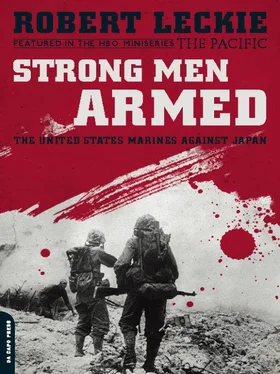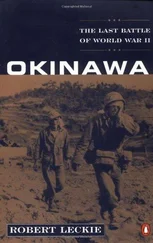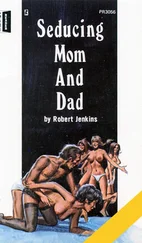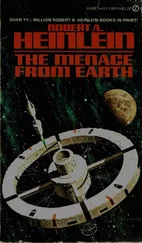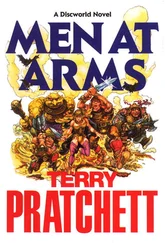Robert Leckie - Strong Men Armed
Здесь есть возможность читать онлайн «Robert Leckie - Strong Men Armed» весь текст электронной книги совершенно бесплатно (целиком полную версию без сокращений). В некоторых случаях можно слушать аудио, скачать через торрент в формате fb2 и присутствует краткое содержание. Город: Cambridge, Год выпуска: 2010, ISBN: 2010, Издательство: Da Capo Press, Жанр: nonf_military, на английском языке. Описание произведения, (предисловие) а так же отзывы посетителей доступны на портале библиотеки ЛибКат.
- Название:Strong Men Armed
- Автор:
- Издательство:Da Capo Press
- Жанр:
- Год:2010
- Город:Cambridge
- ISBN:978-0-786-74832-7
- Рейтинг книги:3 / 5. Голосов: 1
-
Избранное:Добавить в избранное
- Отзывы:
-
Ваша оценка:
- 60
- 1
- 2
- 3
- 4
- 5
Strong Men Armed: краткое содержание, описание и аннотация
Предлагаем к чтению аннотацию, описание, краткое содержание или предисловие (зависит от того, что написал сам автор книги «Strong Men Armed»). Если вы не нашли необходимую информацию о книге — напишите в комментариях, мы постараемся отыскать её.
Strong Men Armed — читать онлайн бесплатно полную книгу (весь текст) целиком
Ниже представлен текст книги, разбитый по страницам. Система сохранения места последней прочитанной страницы, позволяет с удобством читать онлайн бесплатно книгу «Strong Men Armed», без необходимости каждый раз заново искать на чём Вы остановились. Поставьте закладку, и сможете в любой момент перейти на страницу, на которой закончили чтение.
Интервал:
Закладка:
Beneath Oroku, the First Marine Division had broken through to the south coast. Okinawa had been sliced down the middle, but more important to those weary, hungry Marines who did it was the sea outlet to which amtracks could now bring supplies. The men had been a week on reduced rations, slogging through the mud which made supply nearly impossible.
On the eastern flank the 7th and 96th Infantry Divisions were also nearing the southern coast. Lieutenant General Buckner had already made a surrender appeal to Ushijima. He had had a letter dropped behind the lines. It said:
The forces under your command have fought bravely and well, and your infantry tactics have merited the respect of your opponents…. Like myself, you are an infantry general long schooled and practiced in infantry warfare…. I believe, therefore, that you understand as clearly as I, that the destruction of all Japanese resistance on the island is merely a matter of days….
The letter was dropped on June 10. It reached Ushijima and Cho on June 17. They thought it hilarious. How could a samurai surrender? A samurai can only kill himself.
Ushijima and Cho had already resigned themselves to hara-kiri by that seventeenth of June, for by then all was over. On the west flank the First Marine Division was battling through Kunishi Ridge while the Sixth had again come into line on the right and was racing for Ara Point, the southernmost tip of Okinawa. In the east, the 96th Division was finishing off resistance in the Yaeju-Yuza Peaks, and the 7th Division’s soldiers were closing in on the 32nd Army’s very headquarters.
There was nothing left, save the satisfying news next day that the American who had insulted them with a surrender offer was himself dead.
Simon Bolivar Buckner had come down to Mezado Ridge to see the fresh Eighth Marine Regiment enter battle. The Eighth had come to Okinawa on June 15, after seizing Admiral Turner’s radar outposts, and was attached to the First Division. As had happened in the beginning at Guadalcanal, when another regiment of the Second Division was attached to the First, so it was happening in the end at Okinawa.
Colonel Clarence Wallace sent the Eighth Marines in at Kunishi Ridge. They were to attack in columns of battalions to seize a road, to split the enemy in two, to carry out General del Valle’s plans for a decisive thrust to the sea. Lieutenant General Buckner joined Colonel Wallace on Mezado Ridge at noon. He watched the Marines for about an hour. They moved swiftly on their objective. Buckner said:
“Things are going so well here, I think I’ll move on to another unit.”
Five Japanese shells struck Mezado Ridge. They exploded and filled the air with flying coral. A shard pierced General Buckner’s chest and he died within ten minutes—knowing, at least, that his Tenth Army was winning.
Command went to Roy Geiger, senior officer and about to be promoted to lieutenant general. The grizzled white bear who had been at Guadalcanal in the beginning was leading at the end on Okinawa.
That came three days later.
On June 21 a patrol from the Sixth Marine Division reached a small mound atop a spiky coral cliff. It was the tip of Ara Point. Beneath them were the mingling waters of the Pacific Ocean and the East China Sea.
A few more days of skirmishing and a reverse mop-up drive to the north remained. When these were over, and the last of the kamikaze had been shot down, the Japanese 32nd Army was no more, with roughly 100,000 dead, and, surprisingly, another 10,000 surrendered. American casualties totaled 49,151, with Marine losses at 2,938 dead or missing and 13,708 wounded; the Army’s at 4,675 and 18,099; and the Navy’s at 4,907 and 4,824. There was little left of Japanese air power after losses of 7,800 planes, against 763 for the Americans; and the sinking of Yamato and 15 other ships meant the end of Nippon’s Navy. Though the American Navy had been staggered with 36 ships sunk and another 368 damaged, there were still plenty left to mount the fall invasion of Kyushu from Okinawa.
So the Great Loo Choo fell to the Americans after eighty-three days of fighting. A few hours after the Marine patrol reached Ara Point, Major General Geiger declared organized resistance to be at an end.
That night Mitsuru Ushijima and Isamu Cho wrote final messages and prepared to kill themselves.
“Our strategy, tactics, and techniques all were used to the utmost,” Ushijima signaled Tokyo. “We fought valiantly, but it was as nothing before the material strength of the enemy.”
Cho wrote: “22nd day, 6th month, 20 year of Showa Era. I depart without regret, fear, shame, or obligations. Army Chief of Staff; Army Lieutenant General Cho, Isamu, age of departure 51 years. At this time and place I hereby certify the foregoing.”
Precise to the end, Isamu Cho arose and vested himself in the white kimono proper for hara-kiri. He joined General Ushijima, who was dressed in full uniform. They sat down to the last banquet, while the roof of their cave shook to the muffled sounds of American grenades exploding above. Behind them, at the mouth of the cave, they could see moonlight shimmering on the sea. They finished eating and drank off toasts of Scotch whisky. They arose.
“Well, Commanding General Ushijima, as the way may be dark, I, Cho, will lead the way.”
“Please do so. I will take along my fan, since it is getting warm.”
They strolled out to the ledge above the sea, General Ushijima calmly fanning himself. They bowed in reverence to the eastern sky. They sat on a white sheet spread over a quilt.
A hundred feet behind them were the American soldiers. They began hurling grenades, unaware that Ushijima and Cho were so close to them.
First Ushijima, then Cho, bared their bellies to the upward thrust of the ceremonial knife, while the adjutant stood by with his saber, awaiting the sight of blood.
Two shouts, two sword flashes, and it was done—and the moon began sinking beneath a sea turning polished black.
17
And when he gets to Heaven,
To Saint Peter he will tell:
“One More Marine reporting, sir—
“I’ve served my time in Hell!”
It was everywhere behind them, this glorious rough epitaph. It had been pinpricked out on a mess pan nailed to a rough cross among the rots and stinks of Guadalcanal. It had been carved into coconut logs forming that dreadful sea wall at Tarawa. Men had spelled it out with cartridges pressed into the damp black earth of the Bougainville rain forest, or scrawled it beneath Stars of David rising from leveled kunai fields in New Britain. Makin knew it, and the hyphenated coral islets of Roi-Namur in the vast atoll of Kwajalein. Eniwetok, Choiseul, New Georgia, and a dozen forgotten islands where only a handful fell. Marines who lived to sail away from Saipan and Tinian, or from Guam, had left this farewell there in memory of those who did not sail. It had fallen from heat-shrivelled lips on Peleliu, had followed the flag that rose at Iwo Jima, and been scratched on a punctured helmet perched on a bayonet stuck in Okinawa mud.
It was the salute of the brave living to the braver dead, it was a Marine’s sad, sardonic “so long” to a fallen buddy. And yet it was also the epitaph of the mighty island empire that was once Japan’s, for the men who earned or wrote these lines were also the men whose long sea charge had now brought that very “Hell” to within 350 miles of Japan herself.
And they were ready to resume the charge. Six Marine divisions were again in training, again preparing for battle, on the sixth of August, 1945, when a great silvery airplane named Enola Gay rose from that very Tinian Island which had been the masterpiece of Marine warfare. It flew to Hiroshima to drop its horrible mushrooming egg. Three days later The Bomb was dropped again—on Nagasaki.
Читать дальшеИнтервал:
Закладка:
Похожие книги на «Strong Men Armed»
Представляем Вашему вниманию похожие книги на «Strong Men Armed» списком для выбора. Мы отобрали схожую по названию и смыслу литературу в надежде предоставить читателям больше вариантов отыскать новые, интересные, ещё непрочитанные произведения.
Обсуждение, отзывы о книге «Strong Men Armed» и просто собственные мнения читателей. Оставьте ваши комментарии, напишите, что Вы думаете о произведении, его смысле или главных героях. Укажите что конкретно понравилось, а что нет, и почему Вы так считаете.
